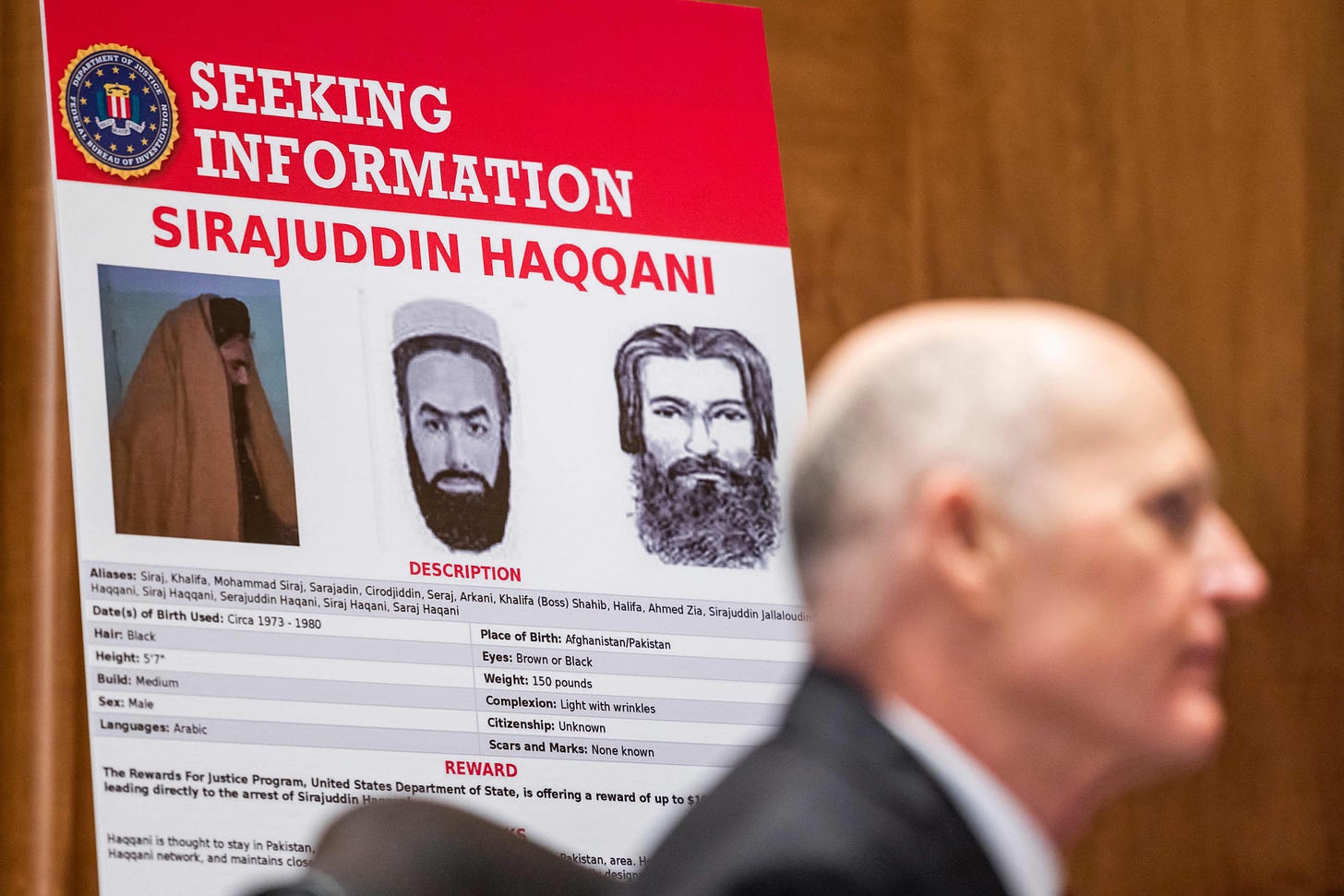Short one today, with your correspondents ping-ponging around the country—Bill’s recently back in D.C. from travel and I (Andrew) am in Denver for tonight’s (sold out!) Bulwark Live event. Looking forward to meeting some of you there!
One quick reminder on that front: Tickets for our next event, September 5 in Dallas, will be going on sale soon. If you’re in Texas, mark your calendar!
And one more unsolicited tip for any of you in Denver who missed out on tickets to us and are forlornly casting about for something else to do instead: Jim Swift and I happened to wander past the Comedy Works club last night, where the great Patton Oswalt happened to be about to do a stand-up set. We grabbed the last two tickets—he was excellent, and he’ll be back there tonight and tomorrow. Happy Friday.

‘The Threat of Terrorism Has Returned’
There’s a bracing new piece up on the website from our military affairs fellow Will Selber: “There is increasing reason to believe,” Will writes, “that there could be a terrorist attack on the United States in the months ahead”:
On June 11, Immigration and Customs Enforcement agents arrested eight Tajik nationals with ties to the Islamic State in Los Angeles, New York, and Philadelphia. These men hailed from the same region as the Moscow attackers, underscoring the breadth of the Islamic State Khorasan Province’s reach. They’re not just factors in the Middle East and South Asia; they’ve now expanded into Central Asia, a prime recruiting ground that the Taliban is also exploiting.
“I think Islamic radicalism is making inroads throughout Central Asia, particularly among the youth,” Col. Abdul Rahman Rahmani, a counterterrorism officer in the former Afghan government, told The Bulwark. “It is dangerous for them and the region.” . . .
Less than a week before the apprehensions, Sirajuddin Haqqani, a senior Taliban official with close familial ties to al Qaeda, conducted his first state visit as Afghanistan’s Minister of Interior Affairs, visiting United Arab Emirate ruler Sheikh Mohamed bin Zayed Al Nahyan . . .
Add on al Qaeda leader Sayf al Adl’s recent call for foreign fighters to go to Afghanistan and a joint FBI arrest of an ISIS splinter cell in Spain, and the number of audacious terrorist gambits and near-misses is starting to grow to an alarming scale. . .
The national security bureaucracy is already straining to support Ukraine and strengthen the transatlantic alliance amid the biggest war in Europe in eighty years, prepare for long-term competition with China, deter Iran and its proxies, and wrest some workable solution out of the Israel-Hamas war. There isn’t a lot of manpower, time, or attention left to devote to Afghanistan. But Afghanistan has once again become the place to be if you want to prepare an international Islamist terror attack.
Predicting the risk of terrorist action is a gloomy and imprecise business, and it’s little surprise that politicians prefer to steer clear of such topics unless events force their hands. But Will argues that the Biden administration should level with Americans about the growing threat:
Whether you agree with Biden’s decision to withdraw is no longer important for today’s fight; we have to focus on the facts as they now stand, and what to do going forward. And we have to learn from the mistakes that my brothers- and sisters-in-arms paid for over the last twenty years. To do that, we have to stop pretending Afghanistan and its terrorist masters no longer exist—and that means admitting that we lost the war in Afghanistan.
The Biden administration must start talking about the current terrorism threat levels. At the very least, the Department of Homeland Security should issue a new advisory bulletin detailing the arrests of the eight Tajik nationals to DHS security partners.
It’s true that Biden’s electoral chances may suffer if voters are reminded of the disaster of the American withdrawal from Afghanistan. But the choice may not be his. He can address the issue as one his administration is taking seriously and present a plan to deal with it, or he can cross his fingers and hope that the terrorists themselves don’t raise the salience of the issue as they did in San Bernardino and at the Pulse nightclub during the 2016 campaign.
Addressing the terrorist threat starts with rhetoric from the president, but it doesn’t end there. The director of national intelligence and the CIA director should shift collection assets and analysts back to this problem set while knocking down bureaucratic walls preventing intelligence sharing that have once again arisen among America’s eighteen intelligence agencies. They can start by reversing their divestment of Pashtun linguists, the language primarily spoken by the Taliban and many of its partners. While the intelligence community maintains a deep bench of seasoned analysts on these target sets, most are working on other targets, like Gaza, Ukraine, and China. The analytic bench is bare. I saw it myself before retirement in January 2024.
The Biden administration also must not recognize the Taliban government of Afghanistan. To do so would be a devastating blow to the morale of every Afghan still yearning for freedom, but it would also legitimize terrorists with American blood on their hands.
There’s lots more in there—read the whole thing.
Taking a Breath
The presidential debate! Supreme Court decisions! The world out there!
I’m anxious. I’m alarmed. You may well be too.
But it’s Friday. There are long months ahead that will give us plenty of occasions for anxiety and alarm. So, my recommendation? Try to put alarm and anxiety aside for the weekend.
(OK, not for the whole weekend. But for at least for a few hours?)
Here’s what I intend to do.
I’m going to watch highlight videos of the late, great Willie Mays hitting, fielding, and running the bases. And I’m going to read many of the fine tributes to him written after his death Tuesday that I haven’t gotten to yet.
One of the pieces I have read is George Will’s. It is, as you’d expect, terrific.
Read it. You may be struck by this paragraph:
In a sense, Mays was too good for his own good. His athleticism and ebullience—e.g., playing stickball with children in Harlem streets—encouraged the perception of him as man-child effortlessly matched against grown men. He was called a “natural.” Oh? Extraordinary hand-eye coordination is a gift. There is, however, nothing natural about consistently making solid contact with a round bat on a round ball that is moving vertically, and horizontally, and 95 mph. Because Mays made the extraordinary seem routine, his craftsmanship and intelligence were underrated.
George is here picking up on a longtime theme of his, developed at length in his 1990 book, Men at Work: The Craft of Baseball.
After Men at Work’s release, the great ancient historian Donald Kagan wrote a respectful but critical review in the fall 1990 Public Interest, offering a wonderful and spirited defense of what he calls a heroic and tragic view of baseball, against Will’s emphasis on work and craft. Will responded in turn with “The Romantic Fallacy in Baseball—a Reply.”
All are worth reading. Needless to say, when thinkers of the quality of Will and Kagan engage on a subject like baseball, you’re led to think about more than baseball. The court and the debate will keep for Monday.
—William Kristol
Catching up . . .
Trump has rapidly eroded Biden’s edge in 2024 cash battle: New York Times
Trump’s convictions fueled donation surge that could reshape contest: New York Times
Why Democrats think Biden’s problem is Biden: Politico
Legal scholars question judge’s plodding approach to Trump’s classified documents case: NBC News
Nvidia’s success is the stock market’s problem: Wall Street Journal
Cheap Shots
Checking in on the RFK Jr. campaign . . .









“Whether you agree with Biden’s decision to withdraw is no longer important for today’s fight; we have to focus on the facts as they now stand, and what to do going forward. And we have to learn from the mistakes that my brothers- and sisters-in-arms paid for over the last twenty years.”—Will Saber
Huh????? Biden’s decision? Have you forgotten the “surrender agreement,” I mean DOHA Agreement, that released 5,800 hardened Taliban and Al Qaeda fighters with American blood on their hands?
Or the fact that the Afghan government collapsed prior to Biden being inaugurated? Or the fact that 80% of the country was in the Taliban hands when Biden took office. Or the fact that Trump reduced troop levels from 22,500 since taking office to approximately 2,500 by December 2020, after he lost?
There was no way Biden could reconstitute the troop levels with the support of the American people in 2021. We had “war on terror” exhaustion, and fighting a pandemic not seen or heard since 1918 during the Spanish Flu (it wasn’t Spanish). Not to mention, most of the Afghan government had fled to safe harbor states.
“It’s true that Biden’s electoral chances may suffer if voters are reminded of the disaster of the American withdrawal from Afghanistan.”—Will Saber
Yes, Biden will suffer, put Trump in office, and Trump will destroy all our institutions that uncover terror organizations, who are charged with enforcing our laws in the US and abroad.
The infighting and division will enable terrorists to succeed, while Trump himself, will use any attack to enact Martial Law, and crack down on protesters. Trump’s minions won’t allow any crisis to go to waste. They will use it to solidify Trump’s authoritarian agenda with extreme prejudice.
So sorry, I can’t buy the premise that Trump can be trusted to protect the Homeland. He won’t listen to any Biden administration officials on the way out, the same way Bush and Cheney refused to take Al Qaeda seriously when they assumed office.
The threat may be real, but alerting the American public will only give Trump officials more ammunition to create the false narrative that Biden is weak on the border, and his administration inept.
It all boils down to “risk vs reward,” and the risk of alerting the American public is too great, vs the risk of an actual terror attack on the US. And the reward for alerting Americans of a possible attack; non-existent!
IMHO…:)
“Biden’s decision to withdraw” from Afghanistan? I’m pretty sure it was Trump’s decision to withdraw, and Biden followed the pre-determined time table already set in motion.